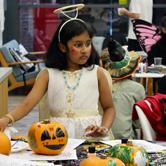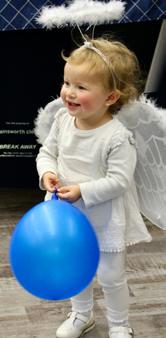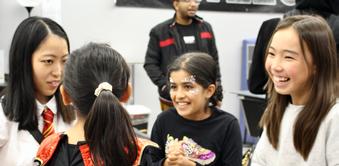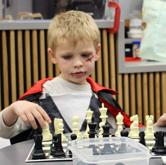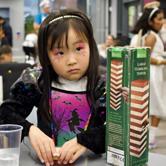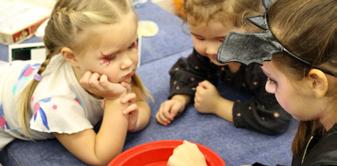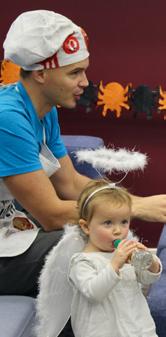New Life Comes
An Article by Jessica MorrisReade about Spring
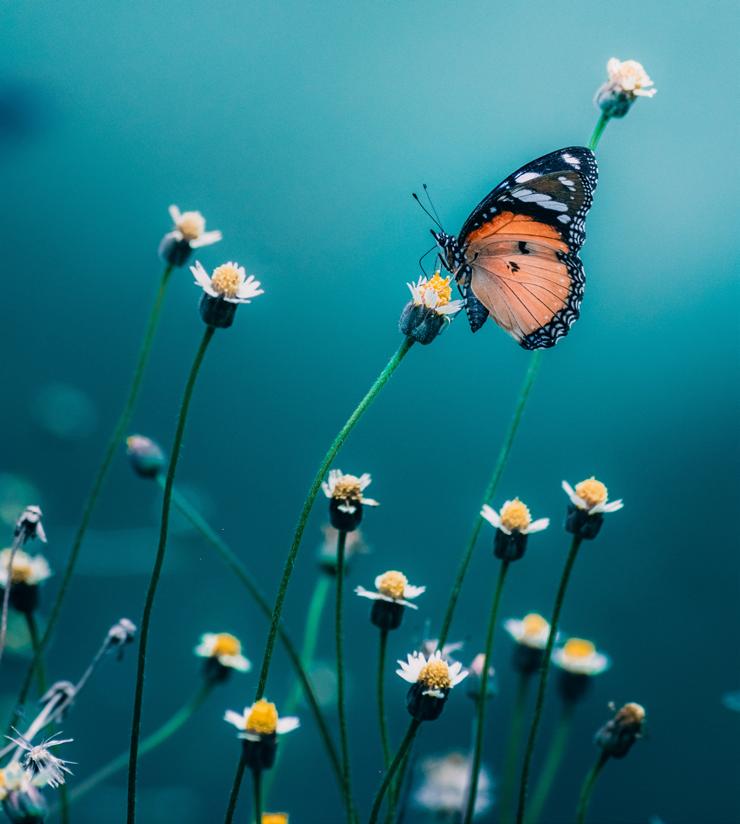
Dilbert the Duck
Featured Poem
Spotlight On: Abundant Earth
Abundant Earth Workers Cooperative
Ustinov Travel Awards Conference Reports

New Life Comes
An Article by Jessica MorrisReade about Spring

Dilbert the Duck
Featured Poem
Spotlight On: Abundant Earth
Abundant Earth Workers Cooperative
Ustinov Travel Awards Conference Reports
Ciel Qin
Writers Glenn McGregor, Joel Lozano, Ayurshi Dutt, Janelle Rabe, Jessica Morris-Reade, Anthony Jones, Rachel Kurtz, Tayrn Ramirez, Rigoberto Ortegas Chavez, Isla Dougall, Rebecca Salthouse, Dori Gasparikova, Cristiana-Iona Balaban.
Editors Katie Anne Tobin.
Special Thanks Paula Furness, Sarah Rosen.
Design
curious12.com
The Ustinovian magazine and blog is written by Ustinovians, for Ustinovians. The views, opinions and positions expressed by the authors and those providing comments in the articles do not necessarily reflect the views of Ustinov College or Durham University.

CUR/02/23/340
If you would like to submit to the next edition of the Ustinovian, please email ustinov.publication@durham.ac.uk
Photo by K. Mitch Hodge PhotographersHailing in the new year, this edition’s theme is ‘Renewal’, envisioning fresh starts and new ways of thinking, ecology and nature, a world in transition, creativity, and bright ideas! For many members of our community, their time at Ustinov College represents a time for renewal, a new chapter in their lives. It’s a theme that – for the past academic year at least – I feel is particularly pertinent to the ever-changing world in which we find ourselves.
This edition traces some of the wonderful achievements made by our GCR members, both in their studies and beyond. My amazing CRiVA (the Centre for Research into Violence and Abuse) colleagues Ayurshi Dutt and Janelle Rabe share their findings from a paper presented at the European Society on Criminology Conference at Malaga. Just as their trip was generously funded by the Ustinov Travel and Research Fund, this edition also showcases the research funded by Ustinov’s Norman Richardson Fellowships too. Through these awards, students working on a range of exciting and innovative projects have had new travel and networking opportunities, documenting how these grants have aided their research.
Other creative contributions include Jessica Morris-Reade’s moving prose New Life Comes and Anthony Jones’ charming poem Dilbert the Duck. Rachel Kurtz profiles the pioneering Abundant Earth workers co-operative and documents how the landscape of the North East calls for greater agricultural collaboration through projects like community gardening. Elsewhere, Taryn Ramirez submits her reflections on moving to Durham in memory of her Aunt Nancy Taitt. And the valuable efforts of a local litter-picking group have been photographed by the very talented Ciel Qin!
On that note, I want to thank all of the wonderful contributors for this edition. It would have been impossible to produce this issue of the Ustionvian without the contributions from our wonderful contributors from the Ustinov college community, and for that, I’m eternally thankful! I also want to give a big thanks to Paula Furness for her unwavering support and guidance throughout this project –and well beyond that too. For those of you interested in contributing to our next issue – focusing on the theme of ‘Resilience’ in line with the forthcoming Ustinov Conference – please do get in touch at katie.a.tobin@durham.ac.uk. In the meantime, I hope you have a wonderful Epiphany term and enjoy the spring!
Katie Tobin

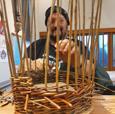
 PhD Candidate in English Literary Studies Ustionvian Editor 2022-2023
PhD Candidate in English Literary Studies Ustionvian Editor 2022-2023



...equally humans have the power to turn things around and halt that change, or at least to contain it within manageable limits.
Kia-ora (hello there) as we would say in my home country New Zealand and welcome to the new academic year at Ustinov College. For many of you, there has probably been much change over the past couple of months as you prepared to start a new episode in your lives at Durham University and Ustinov College. It is often said that this type of change is good as new experiences and opportunities will come about as you start to explore your chosen programme of study and make new friends in your academic departments and at Ustinov. That said not all change is good, especially in the case of anthropogenic (human-caused) climate change.
As some of you may know, besides being the Principal of Ustinov College, I am a Professor of Climatology in the Department of Geography. My research focuses on the impact of climate extremes and climate change on human health and society, especially the extent to which heat waves have emerged as a major societal threat. The evidence for a human influence on climate from the local to a global scale, through altering the nature of the earth’s land surface and emissions of Greenhouse Gases from the burning of fossil fuels, is unequivocal with global temperatures sitting at around 1oC higher than pre-industrial levels. Further the likelihood that warming above pre-industrial levels will be constrained to within 1.5oC, a ‘preferable’ target settled upon by 192 countries who signed the Paris Agreement, the legally binding international treaty on climate change adopted in 2016, is low. This bears serious implications for society as we know it. Admittedly this is all very worrisome and frankly rather depressing, so let’s change the mood.
All is not lost. In simple terms, as humans have demonstrated rather adeptly, but unintentionally, the ability to induce climate change through what
we understand now as the reckless alteration of the gaseous composition of the atmosphere, equally humans have the power to turn things around and halt that change, or at least to contain it within manageable limits. Solutions abound, assuming a lack of leadership and political will do not get in the way of implementing these. In addition to climate change laws and diverse policy instruments (e.g. carbon taxes and emission trading schemes), the pursuit of a rapid transition away from the
individual or community level such as how we live our lives through managing how much and what we consume. I could go on but essentially, my message is we have the power to make changes for the good of the earth’s climate and thus society in general.
It is in that spirit of the power to make changes I will begin to draw this welcome letter to a close. But, before completely signing off, I’d like to posit that in coming to Durham and undertaking postgraduate study, in the back of your mind you are thinking that in one way or another you would like your postgraduate experience here to help set you on a path to be a driver of future social, economic and political change, to be socially innovative and create solutions for the world’s social, economic, environmental and technological problems. I hope you agree with me that all of these aspirations, centred around changes for the good, are compelling motivations for postgraduate study.
dependency on fossil fuels for energy by adopting renewable energy solutions will assist with climate change mitigation and the achievement of a range of cobenefits such as air quality improvement. Encouragingly, over the last ten years there has been sustained decreases in the unit costs of solar energy and wind energy by 85 and 55% respectively making these renewable sources much more attractive. Great potential also exists for digital technologies such as the ‘internet of things’, and artificial intelligence to achieve better energy management in a vast range of economic sectors. Complementing such large-scale solutions are ones at the
Lastly, as you discover what is on offer at Ustinov through the range of Global Citizenship Programme (GCP) and Graduate Common Room (GCR) activities, I hope you become ‘a believer’ in Ustinov College as a great place to be a postgraduate student and that you can find your ‘U’ in Ustinov. Take care all, and again welcome.
Glenn McGregor Professor of Climatology and Principal of Ustinov CollegeThey Say Change is Good, But Not When It’s Climate
My research focuses on the impact of climate extremes and climate change on human health and society, especially the extent to which heat waves have emerged as a major societal threat.
This was the central question at the I hope your time in Durham is full of great achievements and unforgettable memories. As I write this letter on a train from London to Durham, a thought came to my mind. It was a memory, a flashback to 2019 when I started my PhD. I thought about my arrival in the United Kingdom, full of excitement, uncertainty, and fear of being so far away from
home. Little I knew back then that in the next three years I would become the GCR President, I would spend a great amount of time in multiple lockdowns, and that I would find myself writing a welcome letter to our new Ustinovians. I guess when people say that life is full of surprises, they are absolutely right. And since I am now talking about life and changes, I will take this opportunity to tell you about a change that has considerably changed me in these last three outstandingly changing times. Climate change. Yes, that one. The one I hope you are very aware of.
I should probably start by saying that I am a geologist. My career has taken me in many different directions: from studying volcanic rocks to groundwater
to geological formations as prospects for CO2 subsurface storage. My ‘favourite rock’ has changed so many times over time too; it all started with a rhyolite crush, to now sandstone being the one I happily dedicate much of my time. Starting a PhD related to CO2 sequestration has made me see climate change in a very different way. If you had asked me three years ago if I knew what climate change is, I would have replied with a very confident yes. But I think about that answer now and I can tell you that I was wrong. If you had asked me back then if I knew how much CO2 the train in which I am travelling right now emits compared to the car I used to drive back in my home country, I would have replied with a guilty ‘yes’. Or if you had asked me what difference makes eating beef or chicken (which now I try to eat at least five times a week) in terms of our carbon footprint, another elaborated lie would have come out of my mouth. It turns out my pretending to be a green hero resulted only in me being the actual anti-hero. I am not saying that I would beat Greta Thunberg in a climate change

Hi everyone, my name is Joel Lozano, and it is with great excitement that as this year’s GCR President I say welcome to Ustinov College.
Some of the speakers discussed the glaring gender gaps in literary fiction, silencing women’s voices in stories that should feature them at the centre.
knowledge contest, but I know that for every action there is a reaction, and with climate change there is no going back.
I can say that besides my PhD, there are some other experiences that have helped me become a more climate change aware person. During my first PhD year, I submitted a successful application to the Centre for Doctoral Training in Energy at Durham. This experience has given me the opportunity to expand my academic network in an interdisciplinary


environment. Postgraduate students from several Departments of the University meet every Friday to discuss new challenges, technologies and publications related to energy. If you are interested in energy in general, I would like to encourage you to apply since it is a unique opportunity offered only at our university.

I had also the opportunity to obtain my Carbon Literacy Certificate during the summer. This was yet another of the many benefits that come from being a postgraduate student at Durham. One of the requirements to obtain this certificate was to submit a group pledge, with the aim of influencing people to reduce their carbon footprint. This letter is in part that pledges, as I would like to invite you to act now and help fight climate change. Cycle or walking where possible, and buying local to avoid food waste are great examples of small changes that can make a big impact. Climate change is a powerful thing, but people are powerful beings. Let’s use that power wisely.
I would like to finish this letter by letting you know that the GCR is always open to receive applications to create new societies and activities, so if you have any ideas please reach out (climate change action group anyone?). We are here to make your time in Ustinov even better. And from a not-so-new Ustinovian to you, new Ustinovian: enjoy every single moment while at Ustinov and feel very proud of yourself.
Joel Lozano Ustinov GCR President 2022/2023Some of the speakers discussed the glaring gender gaps in literary fiction, silencing women’s voices in stories that should feature them at the centre.
 By Ayurshi Dutt and Janelle Rabe
By Ayurshi Dutt and Janelle Rabe
How can children and young people be meaningfully involved in research related to sexual violence, sexuality, gender, intimacy, and relationships?
Ayurshi Dutt and Janelle Rabe recently answered this significant question through their presentations at the European Society on Criminology Conference at Malaga, Spain on 24 September 2022. Funded by the Ustinov Travel Award and Arklight Travel and Research Fund, Ayurshi and Janelle presented their research as part of the “Researching Young People: Sexuality, Gender and Harm” panel, discussing opportunities and challenges in considering different methodologies to effectively involve young people.
Ayurshi, as a research assistant for a project exploring sexual and gender identities of young people in the northeast of UK, shared the methodological reflections of their research team. Ayurshi organized and co-facilitated workshops with young people (aged between 16-25) from diverse intersectional backgrounds to explore what inhibits or enables their sexuality and gender identities. These workshops
Ayurshi also highlighted the importance of including the missing voices in future related research such as young people from ethnic minority backgrounds, young people with learning disabilities, and young men. Her methodological reflections also included an exploration of difficulties around recruiting men to participate in this project. She shared how, as the workshop facilitator, she had to co-create a space for men to talk about gender and sexuality issues for the first time. Towards the end, the research team received important feedback on how co-produce a bigger project with young people.
Meanwhile, Janelle talked about her reflections using co-inquiry to engage young people in participatory action research, examining their views and meanings of sexual violence and its prevention. She emphasized the importance of sharing the power in
were important in creating a space to talk about sensitive issues and also contributed to the consciousness-raising arm of the overall research by enabling a ‘space for action’ wherein young men and women made sense of their experiences and journeys (Kelly, 2003).
decision-making about the methods and the topic with young people. In practice, this may be difficult since young people usually do not have frames of reference for meaningful work with adults that do not involve them in a tokenistic manner. The other panellists also promoted the importance of listening to the voices of young people in sensitive research since they often have rich insights based on their lived experiences, yet they are often not involved. The lively discussions with the audience showed a keen interest in young people’s participatory research, which is envisioned to be pursued by more postgraduate researchers in the future.
These workshops were important in creating a space to talk about sensitive issues and also contributed to the consciousness-raising arm of the overall research ...
Her methodological reflections also included an exploration of difficulties around recruiting men to participate in this project.

The darkness of winter is as interminable as eternity. The warmth of the sun seems so far away as to have burnt out, a candle at the end of its wick. At first, when autumn falls upon the land and caresses the still-warm ground with rainbows of leaves, we sigh blissfully and manage to endure the last vestiges of summer heat, sopping up what little moisture is left in the Earth and knowing that cool breezes are soon to come. But autumn is short and so are we, our lives entwined tightly with the seasons like constricting vines seeking the firmament. When winter arrives, it comes with a howling vengeance. Our leaves wither and shrink, flinching from the cold to fall at our feet in colourless blankets of loss.
It’s not forever we tell ourselves.
It won’t last.
Our heads bow, our backs bending under the weight of long nights and lightless days. Reassurances and supplications feel as empty as the cloud-choked skies—it will last. It is forever. Doves, wings thick with ice, drop dead from
the boughs of the elder in the corner. Her leaves, evergreen, are anything but. She tries to flutter and shiver, to make the greenish-yellow blades fall but her indignity won’t release its grip.
I’m sorry she whispers.
I’m so ugly.
Bulbs beneath the ground, sedately hidden from view, turn away embarrassed. Infant seedlings, having separated from their mothers to await rebirth when the sun returns, giggle and snigger. The roses, foreshortened but patient, turn up their noses before falling back asleep.
But we, those left standing with our grey withered bodies exposed, simply nod.
Death is ugly we console.
But new life comes.
And it does. It’s shy, at first, the shining star that lights the world, her sheepish reserve telling us she’s sorry to have been away. But soon that melts along

with the frost and her full glory is revealed. Most bask and groan in relief as juices and sap flow once again. Most. Later, the caretakers come, those begloved mavens of the garden who turn the Earth and awaken the soil. They fertilize the elder and revitalize her leaves until they glow with emerald intensity. They water the seedlings and bulbs, their shoots ploughing determinedly through the black loam. They nurture the roses, coaxing them out of their slumber with restoratives and tender care.
But death is ugly. We, the weeds who’ve wintered the seasonal chill, now are faced with the glacial hatred of the gardeners. One by one we are plucked from the ground, discarded and forgotten.
The thing is, the cyclical renewal of spring has no favourites, treasures no plant more than another. Our roots run deep and our memories long, neither can be plucked and eradicated forever. New life comes and us weeds are nothing if not resolute.
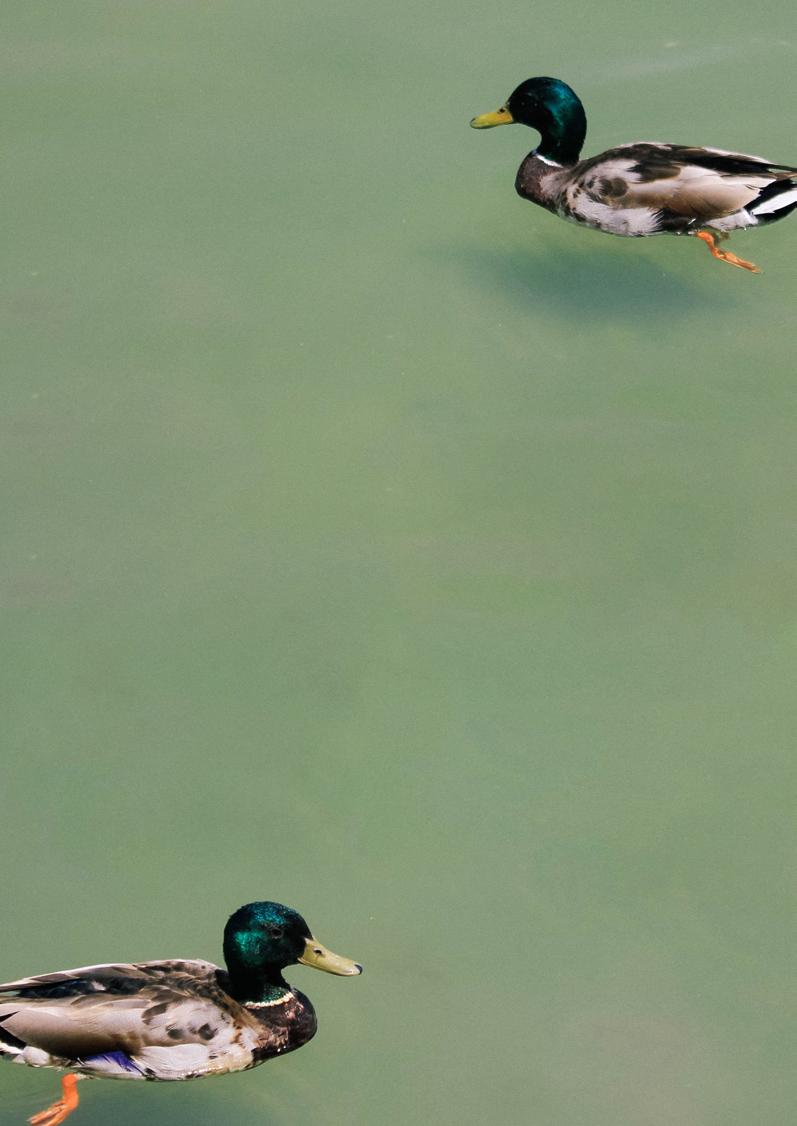
Once upon a time, not so long ago, when the town of Redbrook was still woods, and the sky was blue and the trees were green, there lived a family of ducks in a clearing... For so many years the blue water was still, The rains would come, and the pools would fill. This hideaway of ducks was a beautiful scene, But then all of sudden, their water turned green. You see, day after day a new family came, With a bag full of bread, that fell just like rain. But unlike all the other ducks around, Dilbert really didn’t like the sound. As other ducks ate quickly, Dilbert simply sat, He saw this bread they had started eating, was making them fat. In fact, Dilbert hated this daily event, You see, Dilbert was gluten intolerant. The bread on offer made him feel unwell, his head would hurt, his insides would swell. Unlike other ducks, Dilbert had dreams that weren’t just about bread, Dilbert had dreams about something different instead. I hear you ask, what was Dilbert’s dream?
Well, of clearing up the water and building a home up the stream. Then one day came along small sweet Elouise, With a delightful gift, a bag full of peas. Soon all the ducks of Redbrook swam with delight, The water became clear, as if just overnight. You see, the bread was unnatural, and had turned their water green, But people can help make the water more clean. And after this change, Dilbert swam around with delight, The water was clear, and the future looked bright. So next time you’re in the park, and you’re visiting Dilbert the duck, Feed him delicious corn, seeds or peas, and wish him good luck. His home could be perfect but there is still much to do, And keeping his dream possible, well that’s up to you...
 By Rachel Kurtz
By Rachel Kurtz
In 1800 the region had only 11 coal mines. By the end of the century this number had increased to 166, with a further 65 opened between 1900 – 1960 (Northern Mine Research Society). Around Durham mining was central to economic and social life with a pit in almost every village in the north of the county, so it is hardly surprising that the systematic dismantling of the industry left scars on both landscapes and communities. Decades after the closures, regeneration and renewal remain a major preoccupation. To the west of Durham city in the Deerness Valley, once home to several coal mines, an inspiring and well-established project contributes to this theme.
The inception of Abundant Earth workers cooperative came via the meeting of a group of students in 1990s Newcastle. A substantial group, drawn together by shared concerns around climate change and a commitment to living more sustainably, by the time they had raised enough money to buy some land, they had been whittled down to just four committed visionaries who were also romantic couples: Jo Bolton and husband Matt Whittaker and Beth Currie and her partner Wilf Richards. Despite their divergent trajectories, many of the early contributors continued their involvement by offering volunteering and practical support, along with others like myself who came a little late to the party. Twenty years on the well-established project continues to inspire and attract
similarly minded individuals, generates small-scale employment, and contributes to the local community.
Abundant Earth is just 3 miles from the city centre on the outskirts of Broompark. It is easily accessed by bus or via walking or cycling along the old wagonways, a precious legacy of the mining era that now provides a green transport network across the region. The land is entered through an Exbourne gate beautifully crafted by Matt. While it might easily go unnoticed, the gate marks a transition from a throw-away culture disconnected from the meaning and worth of material things to one in which time and effort are too visible and memorable to be taken for granted. Dedicating one’s life to a project such as this requires an enormous amount of work and necessarily eclipses many other interests. For the members of this particular co-op, it also helped them develop existing skills and acquire some less obvious ones.
While Matt’s practical abilities extend to building, blacksmithing, and sheep farming, his passion is green woodworking for which he has a wellearned reputation and has won several competitions. In addition to exporting hand-turned bowls worldwide, he organises the annual Northern Bowl Gathering, which attracts an impressive array of craftspeople along with participants wanting to try their hand at carving.
The other members have similarly found their calling through the demands of the project. Matt’s wife Jo is an accomplished basket weaver. In recent years she has rented a studio in the old Catholic seminary at Ushaw and she is currently in the midst of a collaboration with other expert basket makers around the country on a refurbishment order for British clothing chain Seasalt. When she is not making baskets, Jo might also be found on the yoga mat, practicing and teaching well-woman yoga.
Wilf’s forte is organisation. Alongside his role as manager of the veg bag scheme, the majority of his work centres around permaculture – an egalitarian movement seeking to develop eco systems that nurture both people and nature. As lead permaculture teacher in the region, Wilf runs a certificated design course that helps participants understand permaculture principles and plan a project of their own, as well as working as a permaculture consultant.
Until recently Beth was the main vegetable grower, however over the last eight years a very different calling has evolved in her life. As you might imagine, with two couples working so closely together, relationships are not always easy and require honest and courageous negotiations. This led Beth to study Nonviolent Communication (NVC), a transformative framework for understanding human thoughts and behaviour and enabling more satisfying and productive relationships. Now a certified trainer, she offers workshops to a variety of groups across the region
and beyond. While all of this fruit grew metaphorically but nonetheless directly from the smallholding, the cultivation of produce on the land just beyond the gate has been central to the development of the project.
Entering into the market garden there is a surprising sense of seclusion given its proximity to the cycle path. A track cuts straight through its centre, bordered on

The landscape of the North East of England was disproportionately victim to the societal greed and environmental violence of the Industrial revolution.
These workshops were important in creating a space to talk about sensitive issues and also contributed to the consciousnessraising arm of the overall research ...
both sides by vegetable beds, polytunnels and other small buildings nestled in between the beds. The track and beds to the right are on the level, while those on the left slope gently downwards hint at the river in the valley below. Initially developed by the founding members, the garden is now run by Lauren. Having joined the co-op as an intern Lauren now manages a small team of volunteers growing for the weekly veg-bag scheme. The garden produce is supplemented with eggs from the hen house down the slope as well as some additional items from other regional organic growers. South-facing, and sheltered by trees on both sides, the site is blessed with a favourable micro-climate and this year Lauren has experimented with growing medicinal plants such as echinacea and calendula in a previously unused area.
Continuing through the garden, its far boundary is marked by another gate, beyond which the summer house overlooks an area of pasture on the way
to the essential compost toilets. A recent addition, the summerhouse was donated by Fruitful Durham CIC when it ceased trading and provides a venue for courses and events for Abundant Earth members and community users. This year it has housed Jo’s well-woman yoga classes, Beth’s NVC courses and grief circles, Wilf’s permaculture design, a local meditation group and a pilates class. The pasture beyond was the venue for the Northern Bowl Gathering and I have hired it myself to run outdoor 5 Rhythms dance classes for the last two summers.
Following the track to the end of the field will bring you to Matt’s saw-mill where he can turn timber into usable planks of wood – an impressive and noisy endeavor! The area beyond this consists of ancient woodland that descends to a lower field, a flood plain for the Deerness river, which forms the land’s southern boundary. Recent recognition of the ecological importance of wetlands inspired the creation of a pond in the
lower meadow, however, this is not yet completed. This area’s only productive use is for growing Jo’s basketry willow, nevertheless, I find it a very peaceful spot for some quiet time, as do the local birds - one evening last summer I sat with my daughter and watched 5 herons come to roost in a single tree!
The influence of the smallholding does not stop at its boundaries or the lives of those who visit. Abundant Earth has been involved in the Ushaw Moor Community Garden just along the road and has delivered projects for many schools and community groups over the years. In an area where pit closures have resulted in a scarred landscape and in some cases, three generations of unemployment, renewal and regeneration are a major concern and Abundant Earth is only one of the many organisations and individuals to contribute, but Durham is lucky to have them nonetheless.
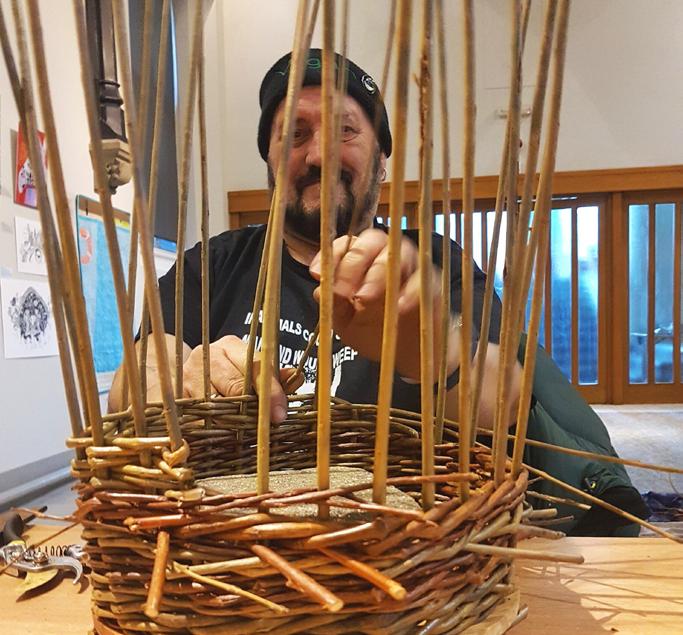


I had had similar thoughts during my first turbulent week in England, like when I stuck my brand-new Oyster card into the ticket slot instead of scanning it, or when I nearly stepped into oncoming London traffic because my careless feet had already forgotten on what side the cars drove. The typical American tourist, I am sure both the train attendant and Underground employee thought to themselves as the latter dug my card out of the machine and the former told me (rather cheerfully) I had missed the train by three seconds.
Although painfully embarrassing, none of these moments quite compared to earlier in the year when I really did question my monumental decision, about three months after I accepted my offer to study at Durham University.
Make no mistake, England captivated me long before watching Downton Abbey or becoming engrossed in all things British. So when the opportunity arose to study for a year in Durham, the excitement of a dream fulfilled overpowered any creeping of fear or doubt; I began researching, planning, and reading all the literature I could, beginning the lengthy processes to travel overseas; and the doubt dozed dormant amongst my subconscious - for a time.
Second-guessing personal choices comes with the terrain of significant life changes, and regrettably, I lack that particular immunity. As the initial dopamine of being accepted wore off and the realities of moving unfurled themselves, any and all reasons to stay in Texas bombarded my thoughts. The uncertainty of success, the guilt of leaving my family, the lurking grip of homesickness, and the anxiety of a health concern two years in the healing circled into a dizzying spiral. Basically, I was scared. Looking back, many of my fears allotted themselves in the “things I cannot control” category, but while in the midst of crippling hesitation, who thinks rationally? Or thinks anything at all besides “maybe yes, maybe no”? I stayed up late at night wondering if it was wise to leave and follow my dream when I had never even left the country before.
One of my favourite TV shows, All Creatures Great and Small quotes, ‘Without fear, there cannot be courage; without courage, there cannot be pain’. There are droplets of pain in everything we do: the pain of leaving, the pain of guilt, the pain of losing a beloved monarch (Rest in Peace, HM Queen Elizabeth II - I missed being in her England by five days), the embarrassing pain of missing your first train. But wouldn’t we take the sting of pain for the hope of courage, and finding solace to withstand the affliction?
The solace I found during my first month in Durham came from the amalgamation of little, trivial things. There is a certain

expectation for culture shock to involve loud, overwhelming differences, and yet, perhaps luckily, because of the little things I found this false. The little things fill the emptiness of difference and doubt; like arguing with your roommates about the merits of Fahrenheit over Celsius; watching their faces blanche when you mispronounce ‘pasty’ by dragging out the ‘a’; overindulging in your first fish and chips with extra mayo; adjusting your weekly schedule to accommodate the days of open independent study; establishing a love/hate relationship with public transportation; matriculating inside an actual cathedral, and cursing the architects of Durham city while wheezing your way up an exceptionally sharp hill. Even the steepest of Durham’s hills are punctuated with breathtaking views (yes, I am thinking about you, path by the Observatory.) The most frustrating events, like forgetting your favourite American spices or falling down the stairs in an 18th-century bed and breakfast, are peppered with humour. Even the gloomiest and most uncertain of national news are permeated with an inextinguishable hope, seen so many times just this year when countries shared in each other’s hardships. There are definitely things I miss about America - the nationwide availability of canned pumpkin and authentic Mexican food being top of the list - and things both physical and emotional I cannot live without - yes, I brought pictures of my dog to keep me company - but with the addition of new friends, constant support from my family, and those frivolous little things, over a time even as short as a month, they keep you whole.
So, the next time I or you start secondguessing the next big adventure, take my advice and stop sabotaging the potential. Listen to those closest to you, listen to your heart, and listen to what captivates you. I am so happy to be here, and happy now to call Durham my home.
As I watched the porter stretch the burgundy tape across platforms four and five, my train north pulling out of the station sans me, I could not help but wonder if I had made the right decision in moving to England for my postgraduate studies.
So when the opportunity arose to study for a year in Durham, the excitement of a dream fulfilled overpowered any creeping of fear or doubt ...
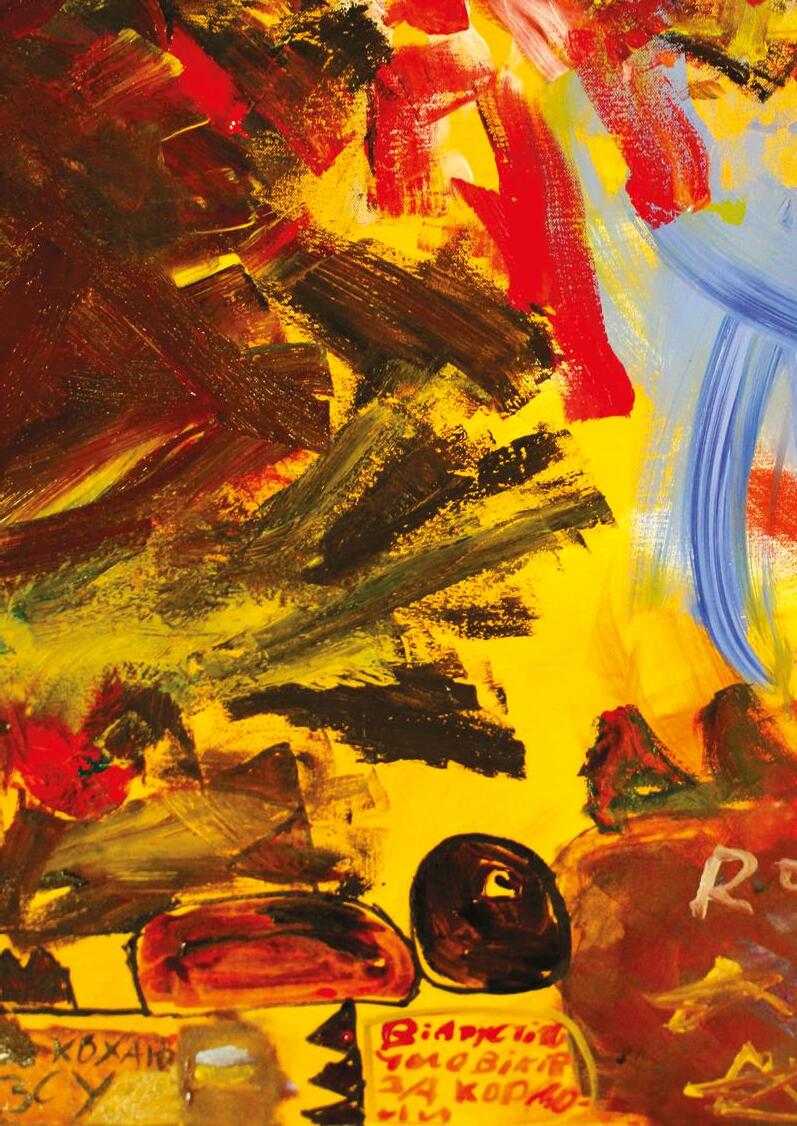
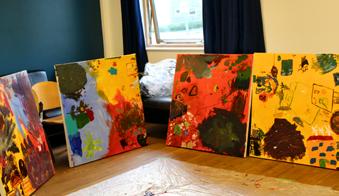


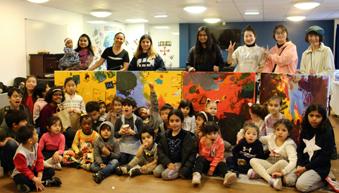
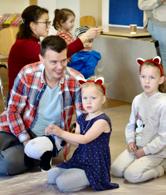
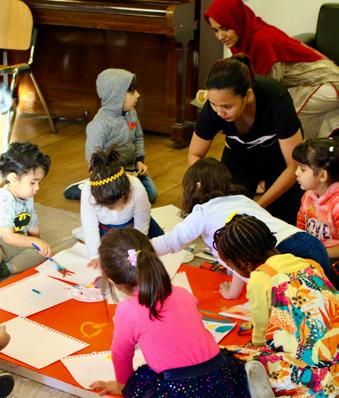
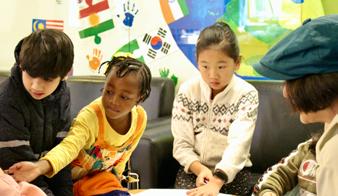
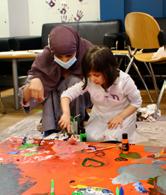
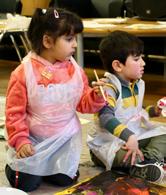
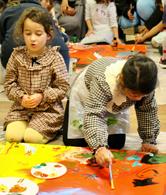

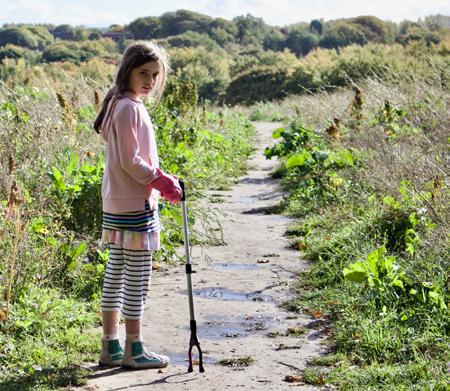
Environmentally conscious Durham University students and members of the local community spent part of Saturday, October 22, litter picking around Ustinov College.






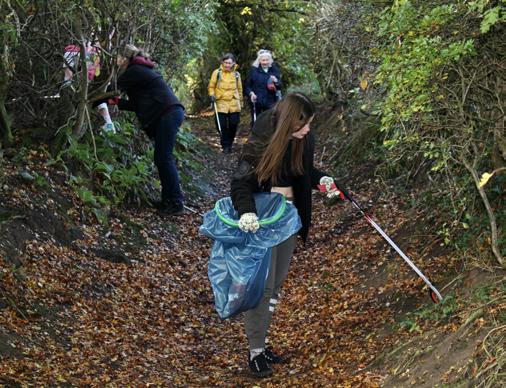
 By Dacosta Omari
By Dacosta Omari
I attended the 29th Innovation and Product Development Management Conference (IPDMC) on 17th – 19th July 2022 in Germany. The conference was organised by European Institute for Advanced Studies in Management (EIASM), and the theme was ‘Innovation in the Era of Climate Change’. The conference was held at Hamburg University of Technology (TUHH), Hamburg, Germany.
I arrived on Sunday afternoon and attended the Conference reception in the evening. The main conference activities were scheduled for 18th and 19th July. Following the opening ceremony, the presenters dispersed into their respective sessions for the commencement of the paper presentations. In all, about one hundred and twenty (120) papers were presented. I was the second person to present my paper in my session on the 18th July. My paper is entitled “The Relationship between Quality Management and Product Innovation: A Systematic Review’. Activities of Day One (1) of the conference came to a close around 4:30pm, and this was followed with a ferry trip and the conference dinner. Activities of Day Two (2) started at 9am and ended at 5pm with the closing ceremony. I returned to the UK on the following day, the 20th July.
Overall, the 29th IPDMC was a useful academic exercise for me as I received incredible and interesting feedback from independent scholars that will be utilised to further refine my paper before it is finally submitted. In addition, it afforded me an excellent opportunity to network and build relationship with influential and highly relevant academics in the field of innovation. Such networking opportunities nurture fertile grounds for future collaborations that can be harnessed to enrich my academic career. In a nutshell, the 29th IPDMC was a phenomenal learning encounter for me and it has really enriched my PhD experience. On this note, I would like to extend my gratitude to Ustinov College as your support helped me to cover the various incidental costs associated with conference attendance.
 By Gabriel Plata
By Gabriel Plata
In July 2022 I presented a paper in the 29 conference
IPDMC: Innovation and Product Development Management Conference, Hamburg, Germany. I attended along with another PhD student from Durham University, who was presenting another paper, and my supervisor. The conference extended for 4 days and reunited people from around the world to discuss about a main topic: “innovation in the era of climate change”.
My presentation was in the morning of 19 July within the Session: “Social and frugal innovation”. I presented along with 2 other representants to a total of 3 papers, (1 from France and 1 from Germany) and one moderator. The audience was about 20 people, mainly PhD students, senior researchers and supervisors. I started the session with a 20-minutes presentation plus about 10 minutes questions and comments. Overall, comments were supportive and constructive. One of the presenters highlighted the point of how economic development in Europe has been aligned to the concept of social innovators, while other economic regions in the world have lacked or require this essential type of actors, with further strength within their social development frameworks. I attended to remaining sessions and presentations in which you were able to choose from an interesting variety of topics.
Overall, the level of contributions displayed was very relevant, these topics and ideas will help us to further understand innovation, immersed in a challenging planet.
On a more relaxed note, the city was very welcoming, and the host university (Hamburg University of Technology) offered nice facilities and services, even though the summer was extreme during most of the days. I would like to thank Ustinov College for awarding me the Travel Awards as the resources helped me to be there.
In 2022 from the 12th to the 17th of September, I participated in my first international conference, the 14th European Conference of Fluid Mechanics in Athens, Greece, via an oral presentation titled “Swirling vortex rings”.



This was an excellent opportunity to show my PhD results so far, talk with other PhD students and professors with the same research interest, and learn a little bit about a great culture and country. The economic support that I received from Ustinov college was a great help, covering the spending of most of my dinners.
Thank you for your support. I am confident that I always represented my university and college with dignity.
 By Rebecca Salthouse
By Rebecca Salthouse
I was awarded the Ustinov College Travel Award in 2022 which enabled me to take part in my first in-person international conference during my PhD, the International Conference on Coordination Chemistry in Italy, as most of my PhD before this had been during the Covid-19 pandemic.
I had been accepted to give an oral presentation at the conference, and this travel grant allowed me to go and share my research with fellow peers and notable professors in my field of inorganic chemistry, as well as giving me the chance to network in-person and make connections from all around the world. This opened up future opportunities as I was offered a Postdoc position and although I did not accept this one, this experience helped to build connections and my confidence to help towards my future career path in chemistry and hopefully academia.
...this travel grant allowed me to go and share my research with fellow peers and notable professors in my field of inorganic chemistry...
 By Isla Dougall
By Isla Dougall
The Ustinov Travel Award helped with costs that allowed me to attend the European Association for Social Psychology and Society for the Psychological Study of Social Issues conference hosted by the London School of Economics. This conference took place over three days from 30th June to 2nd July 2022. The conference was centred around “Society in the Classroom” and aimed to integrate perspectives on how socioeconomic disparities unfold in educational settings.
The conference was structured to run through the years of education from primary school through to secondary school and higher education. A brilliant variety of research was shared by researchers from around Europe and the USA. On the final day, I presented my work on “Social class and wellbeing among staff and students in Higher Education settings: Mapping the problem and exploring underlying mechanisms.” This provided me with a fantastic opportunity to share my work with others and their feedback allowed me to consider different perspectives.
This conference was deliberately small, with no more than 40 attendees, to facilitate networking and collaboration. A conference dinner on the first evening allowed me to meet many new faces and to begin conversations that would continue over the following days. I left the conference with a fantastic new network of international colleagues and potential collaborators. This would not have been possible had I not received financial assistance from the Ustinov Travel Award. These events were highlights of my PhD and I am incredibly grateful for the support I received from my college.
A conference dinner on the first evening allowed me to meet many new faces and to begin conversations that would continue over the following days.
Last year in June I attended a Learn to Sail course with the Durham University Sailing Club thanks to the Ustinov College Travel Award.
The course took place over two days, and it taught me the basic theory behind sailing, including sailing terms like the point of sail, starboard, port, and tack. Before heading onto the water, we were shown how to set up the sails and make sure the boat is secured.
We also practiced sailing manoeuvres on land and on the water. These included jibing and tacking. The sailing course took place at the Derwent Reservoir on
a very nice sunny day and the wind was definitely working in our favour. One of the things I enjoyed the most about attending this course was learning how to read the wind, its direction, and strength to determine how to control the boat in the way I wanted to. My appreciation for the sport also grew, I love that sailing requires not only physical skills but also requires you to be in constant connection with the weather and the wind to ensure the best control. On the second day, our team managed to capsize so I also got to practice how to overturn a boat. The entire experience was great fun. In the end, I managed to earn my RYA (Royal Yachting Association) Level 1 Certificate and I’m excited about progressing to Level 2 sometime in the future!

To conduct my fieldwork for PhD research, I took a 14 hour flight to Dhaka, Bangladesh in late December.

After arriving, I went to the Refugee Relief and Repatriation Commission (RRRC) office of Cox’s Bazar to inform them that I was in Bangladesh and going to start my research. They granted me permission to go inside the camps. At the same time, I was building rapport with the state bureaucrats of the RRRC office as I needed interviews with them for my research too. I met different UN officials and local NGO officials to introduce myself, build rapport and discuss my research.
So far, I have interviewed six state bureaucrats (camp in charge and assistant camp in charge), three NGO legal actors, one activist and lawyer, and two Rohingya persons. I am also conducting participant observation inside the camp Legal Aid Service. Alongside this, I have been participating in various informal meetings and monthly coordination meetings of camp with various actors. My plan for the next few months is to conduct eighteen interviews with the Rohingya community, four interviews with state bureaucrats and six interviews with legal actors and doing participant observation of dealing with legal issues.

They granted me permission to go inside the camps. At the same time, I was building rapport with the state bureaucrats of the RRRC office as I needed interviews with them for my research too.

The European Geosciences Union (EGU) General Assembly is the largest yearly geoscience conference in Europe, taking place in Vienna, Austria. After 2 years of an online-only conference, the EGU General Assembly returned in 2022 (23-27 May) with a hybrid online and inperson format, focused on delivering 5-7 minutes oral presentations in all sessions. Such an opportunity is valuable for current PhD students, whose networking opportunities have been limited under the COVID-19 pandemic.
Reconstructing the extent, style, timing and drivers of past mountain glaciation is crucial in both understanding past atmospheric circulation and predicting future climate change. Unlike in highelevation mountains situated in maritime and continental climates, less is known of past glaciation in mid-altitude mountains, located in transitional climates, such as the Southern Carpathians of Romania. Despite these mountains harbouring a rich glacial geomorphology, this has never been systematically mapped according to well-established morphological criteria, nor confidently related to former styles of glaciation. Therefore, filling this gap is important for not only accurately identifying glacial extents, but also for establishing past glaciation styles and relating them to past ice dynamics and climate. We aim to understand the extent and timing of past glaciation in the Godeanu Mountains, Southern Carpathians. We present a new geomorphological map of the area,
highlighting landforms associated with glaciation of the Scărișoara plateau and surrounding valleys. Using both remote (orthophotographs and Google Earth) and field mapping techniques, we describe and interpret the origins of glacial erosional landforms (icemoulded bedrock, ice-marginal meltwater channels), and of depositional discrete debris assemblages of likely glacial (moraines), periglacial (pronival ramparts, protalus lobes, rock glaciers) and paraglacial (rock slope failure) origins. We also hypothesize the relationship of these landforms with former styles of glaciation. The field study results aid the interpretation of the geomorphology in the wider mountain range. Once absolute chronological results have been produced, the mapping will be used as a spatial constraint for numerical ice-flow modelling in the Parallel Ice Sheet Model (PISM).
The glacial geomorphology of the Scărișoara Plateau, Godeanu Mountains, Southern Carpathians, Romania.
My presentation took place on Monday, May 23rd, 2022, at 15.24-15.30, under the GM7.3 – Mountain glaciations: Developments in geomorphology, geochronology, and palaeoclimatology’ session. Building upon my previous UKbased (online) conference experience (Quaternary Research Association Annual Discussion 2022), this was an excellent opportunity for me to share my research on the glacial geomorphology of an understudied area with an international audience. This being my first opportunity to attend a large, hybrid event with an in-person component, in the last funded year of my PhD, is paramount to my academic career. This is because it enabled me to confidently disseminate the outcome of two years’ worth of PhD research by the means of an oral presentation, which received thought-provoking questions from the audience, and encouraging feedback to boost morale for the latter stages of the PhD and beyond! Consequently, it also enabled me to forge much-


needed networks over coffee breaks, and lunches/dinners, which may lead to some fruitful collaborations in the future. I also thoroughly enjoyed attending diverse conference sessions over the course of the week - a trademark for the largest geoscience conference in Europe - and exploring the vibrant cityscapes of Vienna in glorious weather! Finally, given that my PhD scholarship does not cover research expenses, such as for conferences, none of this would have been possible without funding support from the Ustinov College Travel Award,
a Geography Department Postgraduate Conference Fund, as well as a Postgraduate Conference Grant from the British Society for Geomorphology, I am incredibly thankful for the opportunity!
...past mountain glaciation is crucial in both understanding past atmospheric circulation and predicting future climate change.Value of Award


